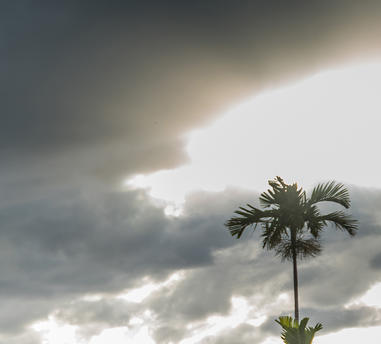Hurricane Preparation
Hurricane Preparation
Important Contacts
- American Red Cross, South Florida Region
305-644-1200 - Emergency Management Office of Miami Dade County
1-888-311-DADE (3233); TTY/TDD: (305) 468-5402 or the Florida Relay Service at 711 - Hurricane Evacuation Centers
- Miami Dade County Hurricane Readiness Guide
- National Hurricane Center
While Palmetto General Hospital has a specific hurricane plan to take care of its patients, it is not a hurricane shelter for the public. Contact Emergency Management at 1-888-311-DADE (3233) for shelter locations.

Getting Ready for a Hurricane
Stay informed.
Hurricane season runs from June 1 through the end of November. During those months, you should stay alert to news of any tropical developments. Local news programs, the radio, the internet and weather channels are great sources of information. Statistically, most hurricanes that make landfall in the United States occur in September, followed by August and July.
Knowledge is key.
Become familiar with terms like “watch” and “warning.” A “watch” means that conditions are favorable for a tropical storm or hurricane to develop within 36 hours. A “warning” means that tropical storm or hurricane conditions are expected within 24 hours. The watch and warning system gives you and your family time to plan and take steps to evacuate if necessary.
You also should know whether the area you live in is prone to flooding or storm surge damage after a storm. If you live in a low-lying area, you should make plans to evacuate before a storm hits. Some coastal areas are subject to mandatory evacuations for hurricanes. Check with local officials to see if your area is part of a mandatory evacuation plan.
Prepare your family.
It’s a good idea to make a disaster plan for your family. You should decide where your family will go if an evacuation is necessary. Since hurricanes often change course, you should have several possible locations in mind that will take you and your family to a safer area. Here are some other tips for making your family’s plan:
- Make a list of telephone numbers that you might need.
- Have an updated road map in your car.
- Locate the safest area of your home, if you decide to stay.
- Plan what you will do with pets if you need to evacuate. Not all hurricane shelters take pets.
- Pack a family disaster supply kit. You may want to include:
- At least one gallon of water per person for three to seven days.
- Non-perishable food for three to seven days.
- Special foods for infants, those on restricted diets and the elderly.
- A manual can opener.
- Cooking tools and fuel.
- Paper plates, napkins, plastic utensils.
- Bedding including blankets or sleeping bags and pillows.
- Clothing for several days.
- First aid kit.
- Medications (including a list of prescriptions, pharmacy information, and prescribing physician).
- Hygiene items such as toilet paper, baby wipes, and waterless hand cleaner.
- Important documents such as insurance policies, social security cards, deeds, wills, proof of residence, driver’s license, birth and marriage certificates, etc. in a waterproof, resealable container.
- Cash and credit cards. (Remember, that banks and ATMs may not be available for several days following a storm.)
- Battery operated flashlight, radio and extra batteries.
- Books, games and other items to help your family pass the time.
When traveling with an infant, make sure you plan for his or her special needs. You’ll need to remember items like formula, baby foods, bottles, baby wipes, and medications for the baby. You may want to pack items like an over-the-counter fever reducer for infants.
If you are planning to take your pets along, you’ll need food and water for them. You should have a carrier or cage for them. Don’t forget to bring along proof of their immunizations as well as any medications that your pets will need. For dogs, don’t forget to bring a leash.
Get your house ready.
Tropical storms and hurricanes mean high winds. You may want to consider having storm shutters installed or purchasing pre-cut outdoor plywood that is at least ½ inch thick for each window of your home. Check trees near your house for diseased or dead limbs, overhanging branches and other possible hazards. Bring in any outdoor furniture, plant containers or other items that can be picked up by the high winds.
Get your car ready.
If a storm is brewing in your area, you may want to keep a full tank of gas in your car. Gas stations often run out of fuel when everyone starts evacuating for a hurricane and they cannot start pumping until electricity is restored after a storm. You may want to plan a summer car check of vital fluids, hoses and belts to make sure your car is in good working order.
